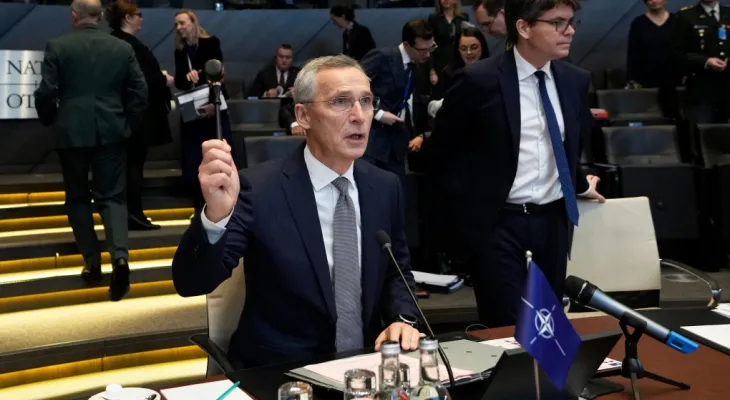Search here
Newspaper
Search here

Arab Canada News
News

Published: February 15, 2024
The Secretary General of NATO warned member states today, Thursday, against allowing a wedge to be driven between the United States and Europe, amid growing concerns about Washington's commitment to its allies if Donald Trump returns to office.
Facing the war in Ukraine that is draining military and financial resources, and with the US aid package stalled due to internal fighting in Congress, European leaders and senior officials warned that Europe must invest more in its armies and new technologies and intensify the production of its weapons.
NATO Secretary General Jens Stoltenberg told reporters at the alliance’s headquarters in Brussels where he was chairing a meeting of the organization’s defense ministers: "I welcome European allies investing more in defense, and NATO has called for this for many years."
He added, "But this is not a substitute for NATO, it is in fact a way to strengthen the alliance, and we must not follow any path that suggests we are trying to separate Europe from North America."
Talk in recent weeks has emerged about Europe developing a nuclear umbrella, with France and the United Kingdom - the US's strong ally - considering NATO the main security organization in the world - and they are the only nuclear powers in Europe.
France has traditionally considered itself a counterweight to US influence in NATO, and it does not participate in NATO's nuclear planning group.
Stoltenberg said: "NATO has a nuclear deterrent, and this has been successful for decades," "we should not do anything that would undermine that. This will only create more uncertainty and a greater space for misjudgment and misunderstanding."
President Emmanuel Macron insists that France must maintain its independence when it comes to the potential use of nuclear weapons. But he said in December that France bears a "very special responsibility" as a nuclear power in Europe and "stands alongside" its European allies and partners.
The talk of a European nuclear umbrella came from German members of the European Parliament, among others. But Chancellor Olaf Scholz and other senior security policy officials believe there is no substitute for NATO's nuclear umbrella.
German Defense Minister Boris Pistorius rejected the debate on European nuclear weapons, calling it a "complex discussion" that should not be embarked upon due to the statements of an ambitious candidate in the election campaign.
Former President Trump, the front-runner for the Republican nomination this year, said on Saturday that he once warned he would allow Russia to do what it wants with NATO members "lagging" in allocating two percent of GDP for defense.
President Joe Biden described Trump's statements as "dangerous" and "un-American," exploiting the former president's comments as they raise doubts among US partners about how much it can be relied on on the global stage in the future.
Stoltenberg said these comments raise questions about NATO’s credibility in collective security - Article 5 of the organization’s founding treaty, which states that any attack on any member state will be met with a response from all member states.
Pistorius told reporters in Brussels on Wednesday: "The nuclear debate is actually the last thing we need right now, it is an escalation in the debate that we do not need."
Deputy German Chancellor Robert Habeck also said that "this big abstract debate will not lead to success." In an interview with German channel Welt, he also expressed skepticism about the idea of making French nuclear weapons part of a European atomic weapons strategy.
He said, "The last thing the French want is a joint European management of their army."
NATO's nuclear deterrence partly relies on American warheads deployed in Europe using local infrastructure. A number of NATO countries contribute aircraft for possible nuclear roles, along with trained personnel, but Washington retains ultimate control over the use of these weapons.
NATO conducts a major nuclear exercise every year to ensure its readiness and to act as a deterrent to any potential aggressor, especially Russia.
Comments